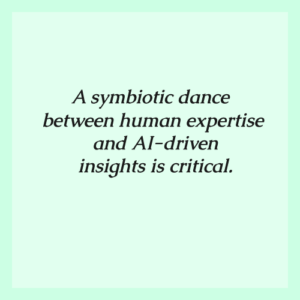AI in M&A: A Double-Edged Sword for Complexity, Valuation, and Private Equity
The impact of artificial intelligence (AI) on M&A is multifaceted, influencing both the complexity and the underlying tools used for valuation, most notably discounted cash flow (DCF) and multiples. However, its effects on private equity (PE) firms paint a complex picture, demanding nuanced analysis.
 Navigating the Labyrinth: AI Simplifying M&A Complexity?
Navigating the Labyrinth: AI Simplifying M&A Complexity?
While M&A has always been intricate, AI offers tools to navigate its labyrinths. Due diligence, traditionally a manual slog, is now streamlined with AI-powered document analysis, uncovering patterns and risks faster and more comprehensively. Target identification benefits from AI algorithms that scan vast datasets to pinpoint strategic fits beyond traditional methods. Regulatory hurdles are mitigated by AI’s ability to analyse legal documents and highlight potential compliance issues.
However, AI doesn’t eliminate complexity entirely. The “black box” nature of some algorithms raises concerns about bias and transparency. If historical data used to train them reflects market biases, algorithms can perpetuate them, leading to discriminatory outcomes. Additionally, while AI excels at data analysis, it lacks the human ability to grasp subtle nuances and navigate complex human interactions, crucial for successful negotiations. Overreliance on AI could lead to misinterpretations and failed deals.
Redefining Valuation: DCF, Multiples, and the AI Advantage
Traditional valuation methods like DCF rely on assumptions and projections, which are prone to human error and subjectivity. AI can inject greater objectivity by analysing vast datasets to build more accurate and nuanced cash flow forecasts, leading to fairer deal pricing. Similarly, AI can analyse historical deals and market trends to suggest more precise valuation multiples, mitigating guesswork and potential over/underpaying.
However, relying solely on AI-generated valuations introduces new risks. Black-box algorithms might miss crucial qualitative factors that human analysts can grasp. Moreover, over-reliance on historical data for future predictions can be misleading, especially in volatile markets. Therefore, AI should be seen as a tool to enhance, not replace, human judgment in valuation.
Additionally, taking a look at the future these days is becoming more and more demanding, as the picture is increasingly blurry due to a ll the uncertainties related to the numerous political situations and the outstanding sudden impact of several innovations. Who would ever have thought that in such a short period, we would have an overwhelming impact from CRISPR Gene editing, AI, autonomous vehicles, renewable energies, mRNA vaccines, blockchain and cryptocurrencies, and IoT? ChatGPT was launched on Nov/30, 2022, and it took 5 days to be used by 1 million people. Twitter needed 2,5 years. Instagram 2,5 months. So, how challenging is forecasting a stream of cash flows now? Very much indeed.
ll the uncertainties related to the numerous political situations and the outstanding sudden impact of several innovations. Who would ever have thought that in such a short period, we would have an overwhelming impact from CRISPR Gene editing, AI, autonomous vehicles, renewable energies, mRNA vaccines, blockchain and cryptocurrencies, and IoT? ChatGPT was launched on Nov/30, 2022, and it took 5 days to be used by 1 million people. Twitter needed 2,5 years. Instagram 2,5 months. So, how challenging is forecasting a stream of cash flows now? Very much indeed.
Private Equity in the AI Age: Beneficial or Harmful?
PE firms are actively harnessing AI for deal sourcing, due diligence, and portfolio management. AI can identify hidden gems, accelerate decision-making, and optimise portfolio performance. However, ethical concerns loom large. Algorithmic bias can lead to discriminatory investment decisions, excluding promising targets based on irrelevant factors. Additionally, overdependence on AI-driven data analysis might overlook crucial qualitative aspects of businesses, leading to suboptimal investment decisions.
The Verdict: A Symbiotic Dance, Not a Binary Choice
In conclusion, AI’s impact on M&A complexity is multifaceted. While it simplifies tasks and offers improved valuation tools, concerns about bias, transparency, and the human element remain. For PE firms, AI offers significant advantages but with ethical considerations to address. Ultimately, the key lies in harnessing AI’s power without succumbing to its limitations. A symbiotic dance between human expertise and AI-driven insights is critical for navigating the increasingly complex world of M&A with fairness, efficiency, and long-term success.